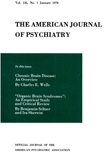The effects of naloxone in chronic schizophrenia
Abstract
In a placebo-controlled, double-blind crossover study of 14 male chronic schizophrenic patients, high doses of the opiate antagonist naloxone were given intravenously. Hallucinations measured on a verbal- report scale were significantly decreased after naloxone administration. The authors suggest that this apparent action of naloxone is mediated by central opiate receptors and that it may result from an interaction between central endorphin systems and central catecholaminergic neurons.
Access content
To read the fulltext, please use one of the options below to sign in or purchase access.- Personal login
- Institutional Login
- Sign in via OpenAthens
- Register for access
-
Please login/register if you wish to pair your device and check access availability.
Not a subscriber?
PsychiatryOnline subscription options offer access to the DSM-5 library, books, journals, CME, and patient resources. This all-in-one virtual library provides psychiatrists and mental health professionals with key resources for diagnosis, treatment, research, and professional development.
Need more help? PsychiatryOnline Customer Service may be reached by emailing [email protected] or by calling 800-368-5777 (in the U.S.) or 703-907-7322 (outside the U.S.).



